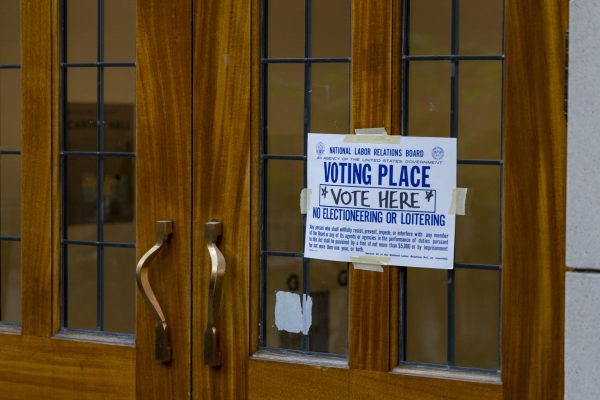The Georgetown Resident Assistant Coalition (GRAC), the organization that represents Georgetown University resident assistants (RAs) in collective bargaining negotiations, finished its second round of negotiations with university officials Sept. 26.
During the negotiations, the university and approximately 20 RAs present agreed on five articles, including sections on arbitrating grievances and creating a labor-management committee, a joint committee of union and university officials who would discuss the contract’s enforcement and interpretation. These negotiations are the second meeting between GRAC and the university after the RAs formally voted to unionize April 16, accepting representation from Local 153 of the Office of Professional Employees International Union (OPEIU).
With the completion of two bargaining rounds, RAs and the university have tentatively agreed on seven of their proposed contract’s 23 total articles while discussing, but not agreeing to, an additional four.

Ulises Olea Tapia (SFS ’25), an RA in Village A and GRAC’s interim bargaining lead, said he expects the university and GRAC to finish negotiations on contractual terms unrelated to payment in upcoming negotiations.
“We have an expectation that the upcoming sessions finish all non-economic matters, so we can dive right into economic matters, but we’re appreciative of the work that was done today,” Olea Tapia said. “I think that we did good work, and I think that they came prepared, and we appreciate that.”
Sam Lovell (CAS ’25), an RA in Copley Hall and GRAC’s interim chairperson, said the agreement on the grievance and arbitration article was particularly important for RAs, who saw unfair discipline processes as a primary motivation for unionization.
“If we had this contract in place last year, there’s a good chance that we never would have unionized,” Lovell told The Hoya. “The reason that we’re here today is because there were people that were subject to decisions about whether or not they could retain their RA position this year and who were not given due process in that decision.”
“I think it is just a really gratifying and satisfying moment to be able to reflect that we have reached an agreement on a tool, on a procedure that will ensure that no RA has to go through that experience again,” Lovell added.
Izzy Wagener (SFS ’26), an RA in Kennedy Hall and the interim vice chairperson, said she was proud of what negotiations had already accomplished, despite the fact negotiators have not yet discussed financial aspects of the contract.
“I feel positive about what we’ve accomplished so far, and hopeful about future negotiations,” Wagener told The Hoya. “But I also think we haven’t really gotten to some of the more significant articles of the contracts. As you know, we’re probably not discussing compensation or anything related to financial issues until the very end of bargaining.”
Lovell said that establishing a labor-management committee would ensure smooth communication between RAs and the university, which he felt has been lacking in the past.
“It’ll just be a really essential way to exchange information between the university and the RAs, and that’s something that we currently really don’t have,” Lovell said. “This is a mechanism to ensure that that kind of communication is occurring and to implement recommendations and changes as appropriate.”
Beyond the agreements on the labor-management committee and arbitration of grievances, GRAC and the university also agreed on articles about severability, which allows contractual sections to be modified or removed without renegotiating the full contract, and nondiscrimination, which prevents Georgetown from treating RAs unequally. Bargainers also approached a tentative agreement on shop steward orientation, the process of teaching union members how to represent the union in a workplace.
During the bargaining session, the negotiators also reached tentative agreements on articles regarding union security, management rights and striking. In a clause known as “no strike, no lockout,” RAs would agree not to strike while the university would agree not to terminate or pause employment.
A university spokesperson said the university is committed to working with OPEIU, who is aiding GRAC in negotiations.
“We deeply value the contributions of Resident Assistants (RAs) to our living and learning community,” a university spokesperson wrote to The Hoya. “Georgetown continues to work in good faith with OPEIU to negotiate a collective bargaining agreement.”
Looking to the next bargaining session, Lovell said he hopes to discuss the university’s process for placing RAs in different buildings, which he sees as an unfair process.
“The way that such decisions have been made in the past has been strictly a function of how well one knows a particular community director overseeing that area,” Lovell said. “It has not previously taken much consideration of an RA’s individual performance or their seniority, and I think that’s wrong and my colleagues think that’s wrong.”
“We’ve developed what I think is a very articulate, sensible, reasonable provision that ensures RAs have a bigger say in that process, as they should, and that rewards RAs who stick it through, who have been RAs for a couple years and who have done their duty,” Lovell added.
A university spokesperson said the university disputes the perception of the RA placement process.
“Georgetown makes housing assignments that best meet the needs of each of its residential living communities,” a university spokesperson wrote.
Olea Tapia said GRAC is eager to negotiate the rest of the articles, adding that union negotiators are ready to adapt to the university’s pace.
“We are ready to negotiate everything,” Olea-Tapia said. “If the university called us tomorrow and said let’s meet all day, we would be happy to meet all day and run a marathon together. It would appear that they like sprints more than marathons, but that is okay, we will adapt.”
GRAC and the university will resume negotiations Oct. 30.









